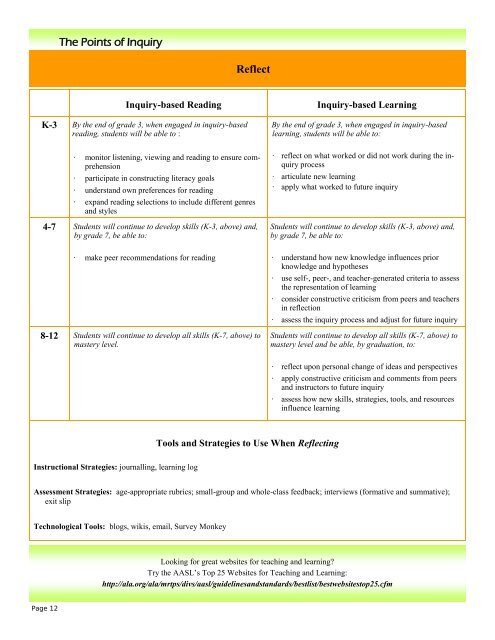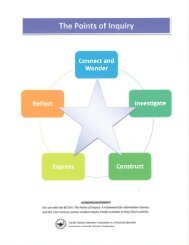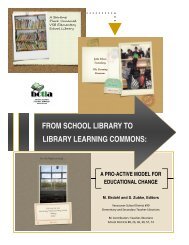PointsofInquiry
You also want an ePaper? Increase the reach of your titles
YUMPU automatically turns print PDFs into web optimized ePapers that Google loves.
The Points of Inquiry<br />
Reflect<br />
Inquiry-based Reading<br />
K-3 By the end of grade 3, when engaged in inquiry-based<br />
reading, students will be able to :<br />
Inquiry-based Learning<br />
By the end of grade 3, when engaged in inquiry-based<br />
learning, students will be able to:<br />
· monitor listening, viewing and reading to ensure comprehension<br />
· participate in constructing literacy goals<br />
· understand own preferences for reading<br />
· expand reading selections to include different genres<br />
and styles<br />
4-7 Students will continue to develop skills (K-3, above) and,<br />
by grade 7, be able to:<br />
· reflect on what worked or did not work during the inquiry<br />
process<br />
· articulate new learning<br />
· apply what worked to future inquiry<br />
Students will continue to develop skills (K-3, above) and,<br />
by grade 7, be able to:<br />
· make peer recommendations for reading<br />
8-12 Students will continue to develop all skills (K-7, above) to<br />
mastery level.<br />
· understand how new knowledge influences prior<br />
knowledge and hypotheses<br />
· use self-, peer-, and teacher-generated criteria to assess<br />
the representation of learning<br />
· consider constructive criticism from peers and teachers<br />
in reflection<br />
· assess the inquiry process and adjust for future inquiry<br />
Students will continue to develop all skills (K-7, above) to<br />
mastery level and be able, by graduation, to:<br />
· reflect upon personal change of ideas and perspectives<br />
· apply constructive criticism and comments from peers<br />
and instructors to future inquiry<br />
· assess how new skills, strategies, tools, and resources<br />
influence learning<br />
Tools and Strategies to Use When Reflecting<br />
Instructional Strategies: journalling, learning log<br />
Assessment Strategies: age-appropriate rubrics; small-group and whole-class feedback; interviews (formative and summative);<br />
exit slip<br />
Technological Tools: blogs, wikis, email, Survey Monkey<br />
Looking for great websites for teaching and learning?<br />
Try the AASL’s Top 25 Websites for Teaching and Learning:<br />
http://ala.org/ala/mrtps/divs/aasl/guidelinesandstandards/bestlist/bestwebsitestop25.cfm<br />
Page 12






